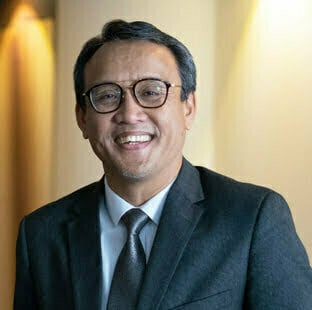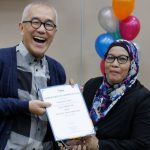Prof Zabidi Azhar Mohd Hussin (in the photo above) is one of the panellists of this webinar
The only solution for the spread of the Covid-19 pandemic that shook the world since the end of 2019, is a vaccine, with many pharmaceutical companies managing to successfully produce vaccines to eradicate this virus. According to the International Federation of Pharmaceutical Manufacturer and Association (IFPMA), in September 2021, the Covid-19 vaccine manufacturing output will surpass the 7.5 billion dose mark. 12 billion vaccines are expected to be produced by the end of 2021, and by June 2022, an estimated 24 billion vaccines will have been produced, which will outstrip the global demand. The question is, is the entire global population vaccinated? Some rich countries have ordered five times more vaccines than their population. Are the low-income countries as equally vaccinated as the rich countries? To answer these questions, The Centre for Bioethics and Humanities IMU in collaboration with Centre for Research Excellence Perdana University (Malaysia), Centre for Bioethics and Medical Humanities Universitas Gadjah Mada (Indonesia), and WHO Malaysia welcomed four esteemed speakers to share their insights on “Vaccine Hoarding in a Vaccine -Dependent World – Immoral?” in a webinar held on 7 November 2021. The session kicked off with A/Prof Dr Teguh Haryo Sasongko, Deputy Director Centre for Research Excellence Perdana University as the moderator of the webinar, introducing the four panelists.
| Panellist of the Webinar | |
|---|---|
| Dr Khor Swee Kheng | Senior Visiting Fellow at the United Nation University, International Institute for Global Health |
| Dr Fina Tams | Consultant for Covid-19 vaccine Preparedness, WHO Representative Office for Malaysia, Brunei Darussalam, and Singapore |
| Dr CB Kusmarjanto SCJ | Senior Ethicist and Philosopher, Universitas Sanata Dharma and Centre for Bioethics and Medical Humanities, Universitas Gadjah Mada |
| Prof Zabidi Azhar Mohd Hussin | Pro Vice Chancellor for Academic Affairs, International Medical University Malaysia, member of Malaysia Medical Council and member of Expert Panel of European Research Council |
It is then followed by Dr Khor Swee Kheng’s presentation on ‘Current Situation and Long-term Outlook of Equitable Access in a Vaccine Dependent World’. He shared that the current situation of the vaccines provided in rich countries and poor countries. The rich countries have administered more booster doses in three months than the poor countries have administered total doses all year. He further discussed the inequality of vaccine distribution among the rich and poor countries. He stressed the factors that contributed to this inequality of distribution and what solutions are required to overcome this problem. Dr Fina Tams presented on the ‘COVAX and the Role of WHO in Vaccine Allocation Framework’. She presented on the COVAX facilities, the global Covid-Vaccination Strategies, the achievement and challenges, and the WHO’s roles. A total of 6946 million doses of vaccines have been administered so far. She stated that COVAX has shipped 421.3million doses to 144 participants. Sadly, immunisation programmes have not yet started in 2 countries, economies, and territories. She stressed that steps need to be taken on vaccine equity campaigns that guarantees fair and equitable access of the Covid-19 vaccine globally, the challenges faced and how they are moving forward. Dr CB Kusmarjanto SCJ, presented on ‘Moral Questions and Ethical Framework’. He discussed the approaches that should be taken globally to overcome this vaccine inequality. He stressed the immoral act of hoarding vaccines and discussed the suitable platform to overcome the problem. He also emphasized how financing the vaccine can be done globally to cater to the entire global population. Finally Prof Zabidi presented on ‘What Do We Tell Our Students in regards to Wealth-based Education’. He discussed the impact of the disparity of vaccine distribution. He stressed that as medical educators, it’s our responsibility to educate our students to be merciful, practice the act of charity, be morally objective, and not judge people based on their skin colours, and always treat people equally. From the pediatric point of view, he pointed out that children tend to follow how their parents and teachers treat people, therefore, it is important to cultivate these crucial values from a young age.
The session ended with a fruitful discussion, with input and questions from members of the audience. The full webinar is also available on IMU CBH Facebook page. Written by Thulasimani Munohsamy, Lecturer, Centre for Bioethics and Humanities (CBH), IMU









